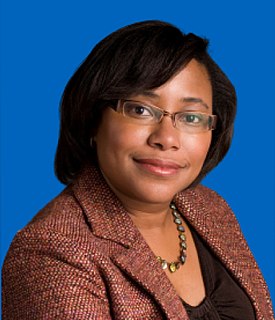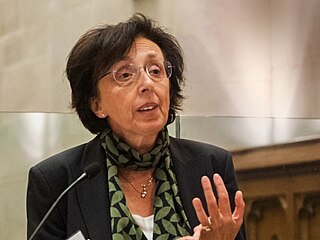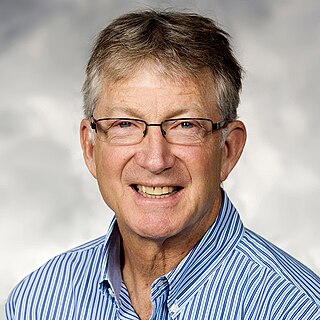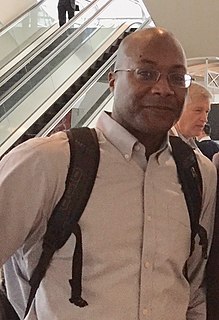Related Research Articles

Armand Paul Alivisatos is an American chemist who serves as the 14th president of the University of Chicago. Alivisatos is a scientist of Greek descent who has been hailed as a pioneer in nanomaterials development and is an internationally recognized authority on the fabrication of nanocrystals and their use in biomedical and renewable energy applications. He was ranked fifth among the world's top 100 chemists for the period 2000–2010 in the list released by Thomson Reuters. In February 2021, he was named the next president of the University of Chicago.

Robert Howard GrubbsForMemRS was an American chemist and the Victor and Elizabeth Atkins Professor of Chemistry at the California Institute of Technology in Pasadena, California. He was a co-recipient of the 2005 Nobel Prize in Chemistry for his work on olefin metathesis.
Ludwik Leibler, born in 1952 is a Polish-born French physicist. He is Professor of École supérieure de physique et de chimie industrielles de la ville de Paris and member of the French Academy of Sciences and National Academy of Engineering.

Jindřich Henry Kopeček was born in Strakonice, Czech Republic, as the son of Jan and Herta Zita (Krombholz) Kopeček. He is distinguished professor of pharmaceutical chemistry and distinguished professor of biomedical engineering at the University of Utah in Salt Lake City, Utah. Kopeček is also an honorary professor at Sichuan University in Chengdu, China. His research focuses on biorecognition of macromolecules, bioconjugate chemistry, drug delivery systems, self-assembled biomaterials, and drug-free macromolecular therapeutics.

Chinedum Osuji is the Eduardo D. Glandt Presidential Professor and the Departmental Chair of the Chemical and Biomolecular Engineering (CBE) at University of Pennsylvania. He is also a former Taekwondo Olympian and represented Trinidad and Tobago. His laboratory works on polymers and soft materials for functional application including liquid filtration. He is the associate editor of the journal Macromolecules.

Paula Therese Hammond is a David H. Koch Professor in Engineering and the Head of the Department of Chemical Engineering at the Massachusetts Institute of Technology (MIT). She was the first woman and person of color appointed as head of the Chemical Engineering department. Her laboratory designs polymers and nanoparticles for drug delivery and energy-related applications including batteries and fuel cells.

The Charles Goodyear Medal is the highest honor conferred by the American Chemical Society, Rubber Division. Established in 1941, the award is named after Charles Goodyear, the discoverer of vulcanization, and consists of a gold medal, a framed certificate and prize money. The medal honors individuals for "outstanding invention, innovation, or development which has resulted in a significant change or contribution to the nature of the rubber industry". Awardees give a lecture at an ACS Rubber Division meeting, and publish a review of their work in the society's scientific journal Rubber Chemistry and Technology.
Timothy P. Lodge is an American polymer scientist.

Juan J. de Pablo is a chemical engineer, Liew Family professor in the Pritzker School of Molecular Engineering at the University of Chicago and senior scientist at Argonne National Laboratory. In 2018, he was appointed Vice President for National Laboratories at the University of Chicago, a title which later expanded to include Science Strategy, Innovation and Global Initiatives in 2020. As of 2021, he is Executive Vice President for Science, Innovation, National Laboratories and Global Initiatives at the University of Chicago. He is known for his research on the thermophysical properties of soft materials. He is currently the co-director of the NIST supported Center for Hierarchical Materials Design (CHIMaD). and former director of the UW-Madison Materials Research Science and Engineering Center (MRSEC). He was elected a member of the National Academy of Sciences in 2022.

Yueh-Lin (Lynn) Loo is a Malaysian-born chemical engineer and the Theodora D. '78 and William H. Walton III '74 Professor in Engineering at Princeton University, where she is also the Director of the Andlinger Center for Energy and the Environment. She is known for inventing nanotransfer printing. Loo was elected a Fellow of the Materials Research Society in 2020.

Matthew V. Tirrell is an American chemical engineer. In 2011 he became the Founding Pritzker Director and Dean of the Institute for Molecular Engineering (IME) at the University of Chicago, in addition to serving as senior scientist at Argonne National Laboratory. Tirrell's research specializes in the manipulation and measurement of polymer surface properties, polyelectrolyte complexation, and biomedical nanoparticles.

Giulia Galli is a condensed-matter physicist. She is the Liew Family Professor of Electronic Structure and Simulations in the Pritzker School of Molecular Engineering and the Department of Chemistry at the University of Chicago and senior scientist at Argonne National Laboratory. She is also the director of the Midwest Integrated Center for Computational Materials. She is recognized for her contributions to the fields of computational condensed-matter, materials science, and nanoscience, most notably first principles simulations of materials and liquids, in particular materials for energy, properties of water, and excited state phenomena.
Frank Steven Bates is an American chemical engineer and materials scientist. Bates is a Regent's Professor (2007–present), a Distinguished McKnight University Professor (1996–present), and department head (1999-2014) in the Department of Chemical Engineering and Materials Science at the University of Minnesota, where he has been a faculty member since 1989. Prior to his appointment at the University of Minnesota, Bates was a member of the technical staff at AT&T Bell Laboratories from 1982-1989.
The Pritzker School of Molecular Engineering (PME) is the first school of engineering at the University of Chicago. It was founded as the Institute for Molecular Engineering in 2011 by the university in partnership with Argonne National Laboratory. When the program was raised to the status of a school in 2019, it became the first school dedicated to molecular engineering in the United States. It is named for a major benefactor, the Pritzker Foundation.

James L. Skinner is an American theoretical chemist. He is the Joseph O. and Elizabeth S. Hirschfelder Professor Emeritus at the University Wisconsin-Madison. He is also a member of the Scientific Advisory Board of the Welch Foundation. Most recently, Skinner was the Crown Family Professor of Molecular Engineering, Professor of Chemistry, Director of the Water Research Initiative and Deputy Dean for Faculty Affairs of the Pritzker School of Molecular Engineering at the University of Chicago. Skinner is recognized for his contributions to the fields of theoretical chemistry, nonequilibrium statistical mechanics, linear and nonlinear spectroscopy of liquids, amorphous and crystalline solids, surfaces, proteins, and supercritical fluids. Skinner is the co-author of over 230 peer-reviewed research articles.
Seth B. Darling is the Chief Science & Technology Officer of the Advanced Energy Technologies Directorate at Argonne National Laboratory. He previously served as director of the Center for Molecular Engineering, a research and development organization partnered with the University of Chicago focusing on advanced materials for cleaning water, quantum information science, and polymer science. Darling is also a senior scientist at both the U.S. Department of Energy’s (DOE) Argonne National Laboratory and the University of Chicago’s Pritzker School of Molecular Engineering. He also directs the Advanced Materials for Energy-Water Systems (AMEWS) Center, a DOE Energy Frontier Research Center formed in 2018.

Thomas H. Epps, III is an American chemist and the Thomas & Kipp Gutshall Professor of Chemical & Biomolecular Engineering at the University of Delaware. He has a joint appointment in Materials Science & Engineering, and an affiliated appointment in Biomedical Engineering. He serves as the Director of the Center for Research in Soft Matter & Polymers, the Director of the Center for Hybrid, Active, and Responsive Materials, and the Co-Director of the Center for Plastics Innovations. His research considers the design, synthesis, characterization, and application of nanostructure-containing polymers related to biobased materials, drug delivery, alternative energy (batteries), nanotemplating, and composite-based personal-protective equipment. He is also the co-founder of Lignolix, which is focused on the valorization of biomass waste.

Rachel A. Segalman is the Edward Noble Kramer Professor and Department Chair of Chemical Engineering at University of California, Santa Barbara (UCSB). Her laboratory works on semiconducting block polymers, polymeric ionic liquids, and hybrid thermoelectric materials. She is the associated director of the Center for Materials for Water Energy System, an associate editor of ACS Macro Letters, and co-editor of the Annual Review of Chemical and Biomolecular Engineering.
Surita Bhatia is an American chemist who is Professor and Vice Provost of Faculty Affairs at Stony Brook University. Her work considers the structure of soft materials, including polymeric hydrogels and colloidal glasses. She was elected Fellow of the American Institute of Chemical Engineers, the American Institute for Medical and Biological Engineering and the Society of Rheology in 2020.
Jim Pfaendtner is an American chemical engineer. He is the Steve and Connie Rogel Professor and Chair of Chemical Engineering & Professor of Chemistry at the University of Washington. He additionally serves as the Associate Vice Provost for Research Computing. Pfaendtner is a staff scientist at the Pacific Northwest National Laboratory.
References
- 1 2 3 "Paul Nealey". Pritzker School of Molecular Engineering. Retrieved 11 October 2021.
- ↑ "Award Abstract # 9703207 CAREER: Molecular Interfacial Engineering for Advanced Applications". National Science Foundation. Retrieved 11 October 2021.
- ↑ "Kavli Frontiers of Science alumni: Paul Nealey". National Academy of Sciences. Retrieved 11 October 2021.
- ↑ "APS Fellow Archive". American Physical Society. Retrieved 11 October 2021.
- ↑ "Paul F. Nealey". Argonne National Laboratory. Retrieved 11 October 2021.
- ↑ "Professor Paul Franklin Nealey". National Academy of Engineering. Retrieved 11 October 2021.